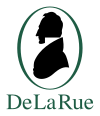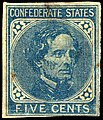De La Rue
 | |
| Company type | Public limited company |
|---|---|
| LSE: DLAR | |
| ISIN | GB00B3DGH821 |
| Industry | Printing |
| Founded | 1821 |
| Headquarters | Basingstoke, England |
Key people |
|
| Revenue | |
Number of employees | 2,311 (2022) |
| Website | www.delarue.com |
De La Rue plc (UK: /ˈdɛləruː/, US: /ˌdɛləˈruː/) is a British company headquartered in Basingstoke, England that manufactures polymer and security printed products including banknotes and tax stamps. It also has a factory on the Team Valley Trading Estate in Gateshead, and other facilities in Debden in Essex and Westhoughton in Bolton.[2] It is listed on the London Stock Exchange.
History
The company was founded by Thomas de la Rue, who moved from Guernsey to London in 1821 and set up in business as a 'Leghorn' straw hat maker, then as a stationer and printer.[3] In 1831 he secured his business a Royal Warrant to produce playing cards. In 1855 it started printing postage stamps and in 1860 banknotes.[3] The company's first banknotes were made for Mauritius.[4] In 1896, the family partnership was converted into a private company.[3]
In 1921, the de la Rue family sold their interests. The company was first listed on the London Stock Exchange in 1947.[3] Then called Thomas De La Rue & Company, Limited, it changed its name in 1958 to The De La Rue Company Limited. A takeover bid for De La Rue was made by the Rank Organisation in 1968, but this was rejected by the Monopolies commission as being against the public interest.[5] In 1991 the company's name was changed again – this time to De La Rue plc.[3]
In 1965 De La Rue established a joint venture with the Italian printer and inventor Gualtiero Giori called De La Rue Giori. Based in Switzerland, the company specialized in building banknote printing equipment.[6] The company printed banknotes for the Central Bank of Iran during the 1960s.[7]
In 1995, the company acquired Portals Limited which had been listed on the London stock market since 1904. For almost 300 years Portals had been regarded as the leading banknote paper manufacturer in the world, having manufactured banknote paper for the Bank of England since 1724.[8]
In 1997, De La Rue acquired Harrison and Sons, the stamp and banknote printers based in High Wycombe. The factory closed permanently in 2003.[9]
In early 2002, De La Rue purchased Sequoia Voting Systems, a California based company that was a large provider of electronic voting systems in the United States, from Jefferson Smurfit Group plc for $23 million.[10] After losing money for three years in a business way out of the company's traditional lines, on March 2005 Sequoia was sold to Smartmatic, a multi-national technology company which had developed advanced election systems, voting machines included.
Following the Panama Papers leak, it was revealed that from 2002 until 2010, De La Rue had secretly contracted New Delhi businessman Somendra Khosla to obtain contracts in exchange for a 15% commission.[11][12][13][14]
In 2003, the company acquired the Debden based banknote printing operations of the Bank of England.[15] In 2003 and 2004 the company supplied banknotes to Iraq.[16][17]
The company was recognised by Hermann Simon as a role model for other small- to medium-sized businesses in his book Hidden Champions.[18]
The Highest Perfection,[19] a history of De La Rue was published in 2011. Written by Peter Pugh for De La Rue, it covered the years 1712–2003.[19]
In August 2014, the company announced the appointment of Martin Sutherland (formerly of BAE Systems Applied Intelligence) as chief executive officer.[20]
In 2016, the Cash Handling division (Cash Processing Systems) was sold to Privet Capital. In December 2016, the company announced it had purchased the DuPont Authentication division.[21][22]
In March 2018, the company sold the paper business. De La Rue retained a 10% share in the new business, Portals.[23] In April 2018, the company decided to appeal against the decision of the British government to manufacture passports in France.[24] It subsequently decided against appealing.[25]
In October 2019 the company sold its Identity Solutions business to HID Global for £42m.[26]
On 26 July 2019, the Serious Fraud Office opened an investigation into De La Rue plc for suspected corruption in South Sudan. They later decided to close the case.[27][28]
Operations

Banknotes
De La Rue sells high-security paper and printing technology for over 69 national currencies.[29]
Security printing and papermaking
De La Rue also produces a wide range of other secure documents, including:[29]
- Bank cheques
- Driving licences
- Tax stamps
- Food Vouchers
Past products
Playing cards
In 1843, De La Rue established its first overseas trade, as De La Rue's brother Paul travelled to Russia to advise on the making of playing cards. Thomas de la Rue's designs for playing cards are the basis for the modern standard design. The playing card business was sold to John Waddington in 1969.[30]
Postage stamps
The company has also printed postage stamps for the United Kingdom and some of its colonies, for Italy and for the Confederate States of America. Some famous stamps such as the Cape of Good Hope triangulars were printed by De La Rue & Co. after Perkins Bacon fell out of favour with the postal authorities of the time. The first 50 years of postage stamp production were chronicled in John Easton's The De La Rue History of British and Foreign Postage Stamps 1855–1901 (Faber & Faber, London, 1958).
Writing instruments
De La Rue claims to have developed the first practical fountain pen in 1881 and was a leading manufacturer of fountain pens in Britain. Products were marketed under the "Onoto" brand. Production of fountain pens by De La Rue ceased in Britain in 1958 but continued for a few more years in Australia.[31]
Board games
During the 1930s De La Rue created a number of board games. These included a cricket game, Stumpz, which was produced in a number of different editions, and Round The Horn, a game which re-created the then annual race of grain-laden, square-rigged sailing cargo ships from Australia to London. The games consisted of high quality components and used playing cards as part of the component set.[32]
Gallery of products produced by De La Rue
-
The King of Diamonds from a De La Rue pack c. 1860.
-
Cape of Good Hope triangular postage stamp of 1853.
-
A sheet of Stamps for St. Christopher, 1884.
See also
- List of mints
- Banknotes of the pound sterling
- Commonwealth banknote-issuing institutions
- Gemalto - a competitor
- Giesecke & Devrient – a competitor based in Munich
- Hong Kong Note Printing – founded in 1984 by Thomas De La Rue
References
- ^ a b c "Annual Report 2020" (PDF). De La Rue plc. Retrieved 5 November 2020.
- ^ "How did Libyan money come to be printed in Britain?". BBC. 2 September 2011. Retrieved 2 September 2011.
- ^ a b c d e "Our History – De La Rue". www.delarue.com.
- ^ "UK banknote printer fears for its future". BBC News. 26 November 2019.
- ^ Competition Commission Reports Archived 4 March 2009 at the Wayback Machine
- ^ International Directory of Company Histories, Volume 34 (2000), p. 141
- ^ Shargi, Ali (15 December 1998), ESKENĀS, vol. VIII/6, Encyclopædia Iranica, pp. 615–624
- ^ "Cash machine". The Economist. 11 August 2012. Retrieved 28 March 2015.
- ^ "Up to 350 jobs to go at printing firm". Your Local Guardian. 7 October 2002. Retrieved 28 March 2015.
- ^ Sequoia Voting systems Receives Mandate from De La Rue, Kiosk Marketplace 29 May 2002
- ^ Marcus Leroux. "Banknote paper trail leads from Panama to India, say emails". The Sunday Times. Retrieved 11 April 2016.
- ^ Danny Fortson. "De La Rue's secret deal exposed by Panama leak". The Sunday Times. Retrieved 11 April 2016.
- ^ "Panama Papers: Currency maker De La Rue offered payoff for its India deal". The Indian Express. 7 April 2016. Retrieved 11 April 2016.
- ^ "After politicians and industrialists, Niira Radia named in Panama Papers | india". Hindustan Times. 6 April 2016. Retrieved 11 April 2016.
- ^ "Bank of England: Sale of Bank Note Printing Operations".
- ^ Moore, By James. "Iraq windfall gives lift to De La Rue". The Daily Telegraph. Retrieved 4 January 2017.
- ^ "De La Rue shares surge on deal to print new banknotes for post-Saddam". The Independent. 8 July 2003. Retrieved 4 January 2017.
- ^ Simon, Hermann: Hidden Champions of the 21st Century : Success Strategies of unknown World Market Leaders. London: Springer, 2009.- ISBN 978-0-387-98147-5.
- ^ a b Pugh, Peter (2011). The Highest Perfection. Icon Books Ltd. ISBN 978-184831-335-4.
- ^ "Banknote printer De La Rue appoints BAE's Sutherland as boss". The Telegraph. 29 August 2014. Retrieved 8 November 2014.
- ^ "De La Rue to Acquire DuPont Authentication Business | Healthcare Packaging". www.healthcarepackaging.com. Retrieved 4 January 2017.
- ^ Goldsmith, Courtney (12 December 2016). "De La Rue shares rise after it says it will acquire DuPont Authentication". Retrieved 4 January 2017.
- ^ "DE LA RUE PLC Completion of paper transaction". polaris.brighterir.com.
- ^ Elgot, Jessica (2 April 2018). "Post-Brexit passports contract: De La Rue to appeal against decision". the Guardian. Retrieved 3 April 2018.
- ^ Monaghan, Angela (18 April 2018). "De La Rue drops passport appeal and issues profit warning". The Guardian.
- ^ Keller, Sinead. "De La Rue announces sale of Identity Solutions Business". www.delarue.com.
- ^ "De La Rue Plc".
- ^ "SFO closes investigation into De La Rue Plc". 16 June 2020.
- ^ a b "About us". delarue.com. Archived from the original on 25 June 2014. Retrieved 28 March 2015.
- ^ Wintle. "History of De La Rue". The World of Playing Cards. Retrieved 28 March 2015.
- ^ "History of Onoto Pens". onoto.com. Archived from the original on 23 April 2015. Retrieved 28 March 2015.
- ^ "Stumpz by Thos. de la Rue & Co. Ltd". replaycricket.com. Archived from the original on 2 April 2015. Retrieved 28 March 2015.
External links
- Companies listed on the London Stock Exchange
- Manufacturing companies established in 1821
- 1821 establishments in England
- Manufacturing companies of the United Kingdom
- Postage stamps of the United Kingdom
- Banknote printing companies
- Playing card manufacturers
- Companies based in Basingstoke
- British brands
- British companies established in 1821




